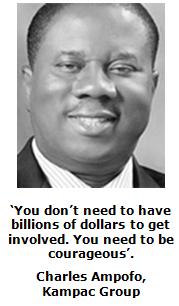 ReConnect Africa is a unique website and online magazine for the African professional in the Diaspora. Packed with
essential information about careers, business and jobs, ReConnect Africa keeps you connected to the best of Africa.
ReConnect Africa is a unique website and online magazine for the African professional in the Diaspora. Packed with
essential information about careers, business and jobs, ReConnect Africa keeps you connected to the best of Africa.



 Elvina Quaison reports on a recent forum that explored the challenges and opportunities presented by Ghana’s continued positive growth story
Elvina Quaison reports on a recent forum that explored the challenges and opportunities presented by Ghana’s continued positive growth storyThe UK network Star100 presented another interesting and useful event in late 2012, ‘Sustaining Ghana’s growth: challenges and opportunities’, as part of their Big Issues series. The event was hosted by Shell plc, which was apt, as everybody in the room and around the world have their eye on Ghana’s black gold, oil.
While oil held a central position in the evening’s discussions, the panel featured five speakers from the academic, telecommunications, private equity, agriculture and oil worlds, and it was positive to hear the panel speak about these other sectors.
The first speaker was Professor John Sutton who posed the question ‘What is going to happen to half a dozen countries in Sub Saharan Africa over the next 10 years?’
According to Professor Sutton, the countries he highlighted have one thing in common; they have experienced significant one-off changes that injected energy into their economies. In the case of Ghana, its initial ‘one-off’ was gold. This could be replaced eventually by oil, he said, if that commodity is handled properly by the necessary authorities in the country. He addressed the role of local trading companies that have a significant impact on Ghana’s economy and yet, he argued, are often overlooked by government.
What could be an effective way forward, he suggested, is for local business to be included in the supply chain for the sector in a meaningful way. Here, he said, the role of government is key. In countries where Foreign Direct Investment (FDI) interest is growing, Sutton suggested that a conversation between the two parties should take place to enable a mutually beneficial outcome, as opposed to what often happens where Governments make rules which are well intentioned, but simply do not work out in practice.
Sutton sees a positive way forward for local companies in Ghana if they are able to come together to access contracts and, as he said, ‘through maximising ability they would maximise opportunity’. He cited the example of insurance companies that may not have the capacity to individually insure an oil rig but, if working as a collective, would be in a much stronger position.
Sutton brought his presentation to a close with two suggestions. Firstly, that there is a closer tie-up between the oil industry and local industry and, secondly, that Ghana’s government plays an active role in settling and incorporating companies into the system.
Another speaker on the panel was Amone Gbedemah, a Business Manager to Nick Read, the CEO of the Africa, Middle East and Asia Pacific region of Vodafone Group Plc.
A British-born Ghanaian, Amone previously lived in Ghana where she helped to set up Vodafone’s operations in Accra. In her presentation, Amone described the possibilities available to entrepreneurs in providing support and other associated services to the telecoms sector and drew attention to the needs of Ghana’s youth, who make up over 50% of the population, and the possible market for services directed at them.
Amone highlighted how access to internet services through mobile phones has opened up a new wave of possibilities for enterprising young people. ‘Feature phones’, simplified versions of Smart phones, are relatively affordable within Ghana and are increasingly popular with the youth who use it to access social media, e-mails and the internet - Facebook alone has 1.6 million Ghanaian users.
Technology has created opportunities for the IT savvy and for investors to fill the gap of developing content for these phones, she said, be they educational, apps or any other telecoms-based endeavours that can respond to the needs and interests of the consumer.
98% of Ghanaians own a phone and this has opened the way for people to use SMS as a means of providing services. Amone cited two examples: MPESSA, a mobile money feature, and M-Health, a feature which informs people of the closest location where they can access the medicine they need.
Amone closed on two key pieces of advice. Firstly, if you are running a business, identifying an element that helps local communities can be a major benefit to your company. Secondly, companies coming into Ghana, or indeed any new country, MUST develop local knowledge to ensure that what they are bringing to the country is really wanted.
The panel topic moved from telecoms to finance with a presentation from Simon Merchant, the co-founder and CEO of Jacana, a private equity firm that focuses on working with Small Medium Enterprises (SME)'s. The company started four years ago and it is fast growing into a pan-African organisation.
Merchant highlighted some of the many opportunities and possibilities that are available in Ghana but came back to one key point: 'execution'. He cited the major deficiency to be found with current businesses and services as being the poor level of professionalism and reliability on offer. If a competitor were to enter the market now, he added, all they would really need as a unique selling point would be to say ‘we get the job done properly and as agreed.’ Ghana, he said, “needs doers; execution is the way to success.”
Merchant identified a distinct role for the Diaspora in the work of his company. For Jacana to assist SME's in Ghana, they need to be sure that the existing management is able to follow and implement the requirements that will be made. The insight and expertise of professionals in the Diaspora would be helpful to companies in this situation and he suggested that those interested in this sector should consider taking up operational management or Non-Executive Director roles. Diaspora professionals could also take the route of become involved as Angel investors.
Addressing the agricultural sector on the panel was David Warwick, founder of MASDAR, a company that has been working in Agriculture for 35 years. The company has been present in Ghana since 1977 and works closely with the Ghana Cocoa Board. David highlighted agriculture as an important area of focus. Currently agriculture makes up 35% of the country’s GDP and hires 65% of the population.
 However, he noted, increasingly people in the rural areas, especially the young, are moving to the urban centres of country which, in addition to the expanding foreign interest into Ghana and natural population growth, has led to estimates of the urban population tripling by 2050.
However, he noted, increasingly people in the rural areas, especially the young, are moving to the urban centres of country which, in addition to the expanding foreign interest into Ghana and natural population growth, has led to estimates of the urban population tripling by 2050.
This trend, he noted, will mean an increased demand for food as well as the diversification of consumer consumption trends as new tastes are introduced. This has already been seen in the increased demand for rice and increased consumption of meat.
While agriculture is critically important for the economy and for the population, he said, it does not receive enough attention to make it an attractive proposition for entrepreneurs. This said, there have been a number of success stories of local and foreign companies going into production in Ghana.
David highlighted some areas and forms of agricultural investment that people should consider and advised that before any business goes into production, they should be certain that they are able to secure the correct produce for their endeavours.
The final speaker at the event was Charles Ampofo, the founder and CEO of Kampac Group, a United Arab Emirates-registered company with its Head office in Dubai. Ampofo has been in the oil industry since 1985 and brought a very open and practical approach to his presentation.
Highlighting opportunities in the oil industry, he cautioned against seeing it as a quick-win option. Reflecting on the approach often taken to business in Ghana, he noted that ‘we like shortcuts. With the oil sector, however, planning has to be long term. You can’t take a shortcut, but our mentality doesn’t encourage long term planning’.
Ampofo urged Ghanaians to stay competitive and look ahead to the future opportunities available. His advice to Ghanaians in Ghana and abroad was ‘you don’t need to have billions of dollars (to get involved). You need to be courageous’.
This was a very successful and enjoyable event with Star100 indeed bringing us ‘The Big Issues’ in an attractive, interesting and informative way. The next event, when it is announced, will definitely be a date for the diary!
